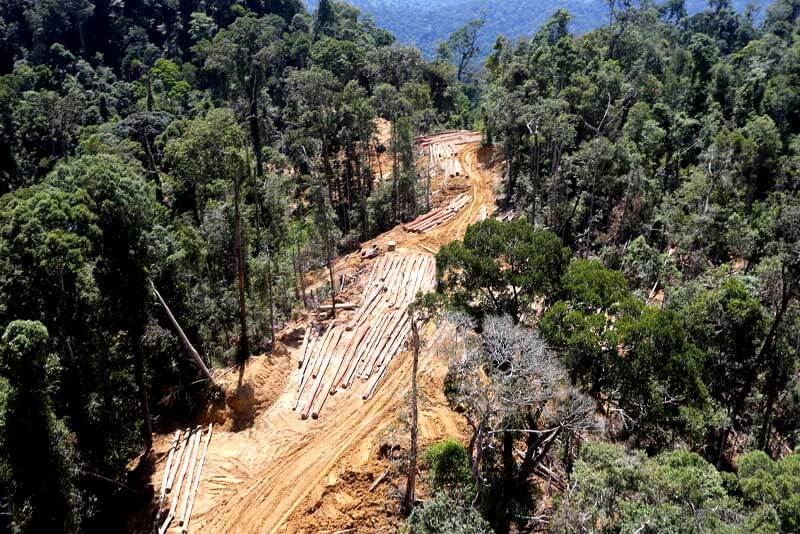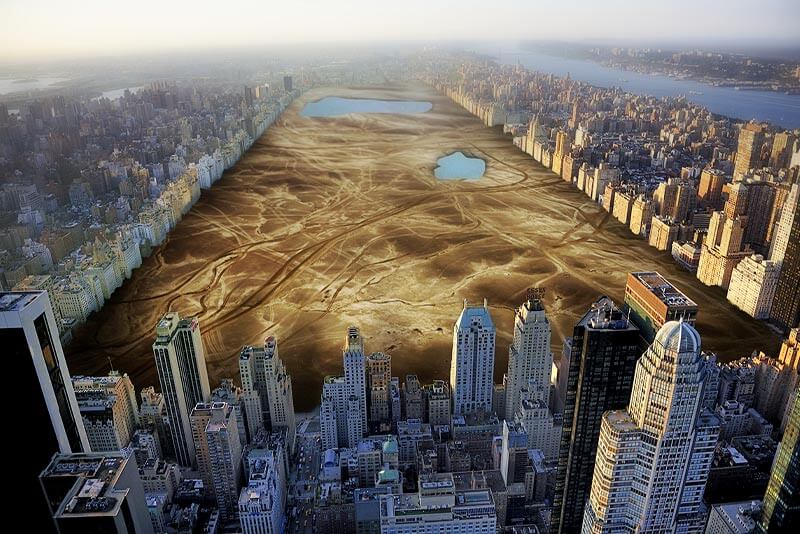Trees play a vital role in the survival of both humans and animals. If deforestation continues at its current rate, the world’s rainforests are predicted to disappear within the next century.
If all the trees were cut down, we would lose extraordinary and essential functions for life on Earth. Since trees produce one-third or 28% of the oxygen on earth (70% from marine plants), we can still breathe if all trees were cut down. However, trees are great at capturing and storing CO2 so apart from the complete collapse of the world’s ecosystem, the air won’t be filtered making it filthy and more toxic for everyone to breathe.
Read on to find out more about what would happen if all the trees on earth were cut down.

What we cover
ToggleWhat happens if there are no more trees on earth?
Loss of habitat
Trees are homes to many animals and plants. If there are no more trees on earth, ecosystems and biodiversity will disappear with it. Various groups of organisms will experience massive extinctions.
Loss of habitat is already a leading cause of global extinction, which is why destroying all forests would be catastrophic for the lives of plants, animals, fungi, and many more.
In 2018, it was found that in areas with scattered trees, the richness of the overall species was 50% to 100% higher than in open areas. Therefore, a single tree in an isolated area can already provide resources for many animals and plants.
Losing one tree can severely impact small ecosystems or local biodiversity.
Lower oxygen
Without trees, humans would still be able to breathe, however, the oxygen levels will seriously drop.
While the oxygen on earth predominantly comes from the ocean, specifically the marine plants and other plant-like organisms, the rest of the oxygen comes from the trees and plants through photosynthesis.
It was estimated that it would take 3,600 years before humans would no longer be able to breathe because of the lack of oxygen provided by trees. However, this estimation was made without considering the increase in population.
Substandard Soil
The soil is also one of the things that will be critically affected by the absence of trees. If deforestation continues to be rampant, the soil will deteriorate.
This is because the role of the trees is to filter dangerous chemicals and pollutants from residing in trees. Without trees to filter, it will be hard to grow anything healthy on earth.
According to the Food and Agriculture Organization, 2.5 billion2 people rely on agriculture for livelihood.
Soil erosion
The absence of trees will cause the soil to erode, making it impossible for farmers to do their jobs.
The roots of the trees keep the soil together. Without the roots, it would be very easy to wash the soil away during heavy rains. The soil would no longer be suitable for growing crops.
Not only will soil erosion cause agriculture to plummet, but this will also cause wildlife to lose their forest habitats. Additionally, because plants are the foundation of all food chains, everything else in the food chain would also be affected.
Unbreathable air
Even though humans can still breathe and survive on Earth without trees, we still need clean, breathable air. Without it, we might just be headed to our demise.
It is also the responsibility of trees to filter pollutants from the air. Carbon dioxide, sulfur dioxide, and other greenhouse gasses are some of the particles and pollutants that are filtered by the leaves of the trees.
For trees to produce oxygen, they absorb carbon dioxide from the atmosphere through photosynthesis. There will be higher amounts of pollutants and lower amounts of oxygen.
Hot temperatures
Trees have the ability to absorb heat instead of reflecting it. Their localized cooling effect helps provide shade that maintains the temperature of the soil, among many other things.
Deforestation1 is responsible for at least 15% of global greenhouse gas emissions. Human activities that produce carbon monoxide will continue and trees will be left un-photosynthesized, causing warmer temperatures.
If we lose trees, we also lose their cooling services ultimately leaving the planet to suffer extreme humidity.
Chronic drought
The water cycle is regulated by trees. They absorb water from the soil and release it into the atmosphere by transforming the water into vapor. The vapor allows the forests to contribute to cloud formation and precipitation.
So without the presence of trees, there would be fewer chances of rainfall, causing chronic droughts. Chronic droughts will disrupt industrial operations and end crop production unless drought-tolerant fruit trees are utilized.
Without this crucial role of returning moisture to the atmosphere, lands will absolutely dry out and temperatures will rise. Trees are responsible for regulating and anchoring the dirt by releasing water.
Flooding
In the absence of trees, drought is not the only harsh environmental condition the planet is going to experience. In the event that rain does fall, we will experience heavy flooding.
Without trees to absorb water from the rain, floods are most likely to happen especially in residential areas. Trees help prevent flooding by storing water and stopping it from rushing into lakes and rivers.
The trees keep the soil in place and allow microbial communities to survive. They help alleviate storm surges in coastal communities.
Additionally, heavy flooding could also cause soil erosion, which will affect the oceans by destroying coral reefs and other habitats. Losing trees also means losing huge amounts of land to the ocean.
No tree-based products
Humanity relies so much on products that come from trees. More often than not, there are products that we use on a daily basis that we don’t know are actually made from trees.
Man’s need for wood products, pulp or paper products, chemicals, cellulose fibers, and food all come from the 15 billion trees that are being cut down every year. These daily needs will be impossible to meet if there are no more trees.
All of these products will cease to exist. Humanity will move backward, and it will be more than difficult to adapt, or even survive, in a world without trees.
Can we live without trees?
Life will not immediately be wiped out the moment all trees disappear. However, it will slowly vanish over time. A huge portion of the clean air we breathe depends on the trees.
Besides being a source of oxygen, trees contribute to maintaining life on Earth. After all, they are considered to be the lifeline of the planet. Humanity, the plant kingdom, and the animal kingdom will experience great losses without them.
Just because they can be replanted anytime, trees are treated as disposable resources. However, reforestation is barely catching up with the amount of deforestation happening today.
The existence and preservation of trees have never been more important. With our experience of global warming today, we need these trees to sustain life.
How can you help prevent deforestation?
Do your part in contributing to the efforts against deforestation by incorporating these steps into your everyday routine.

Consume less
Even though it is normal for us to consume to survive, humanity these days is over-consuming. Society is demanding too much and resources are running out. At this rate, the planet will no longer be able to keep up.
According to the UN Food and Agriculture Organization (FAO), roughly one-third of the food produced globally every year for human consumption is wasted or lost. Therefore, if we all start consuming less, the demand will also decrease.
With less consumption and consequently fewer demands, the production of tree-based products will slow down, resulting in less forest land experiencing deforestation.
Avoid products with palm oil
Palm oil is the world’s most used and efficient oil. Unfortunately, it is also one of the leading reasons for illegal deforestation, especially in Asia.
Cookies, crisps, noodles, and soaps are some of the industrial and transformed products that use a lot of palm oil. According to Greenpalm, about 50%3 of the products in supermarkets contain palm oil.
If you want or need these products, choose a more homemade option with fewer chemicals and food preservatives. They are not only good for the environment, but they are also good for your health.
Shop consciously
You can still help prevent deforestation in your own little way by shopping consciously. There are a lot of companies out there that are committed to reducing deforestation, and you can support them by buying their products.
Humans still need to consume, so if you do consume, make sure to consider the source of the products you are buying. Products that are locally produced and have a fair trade label are good options.
Spread awareness
Spreading awareness can help raise consciousness. As you do your part in helping to spread awareness about the effects of deforestation, you can actually make an impact when a person listens and gets empowered.
Let people know what they can do as individuals living their normal lives to combat deforestation. You can always start small – talk to a friend, start a petition, make changes in your apartment building, and more.
A political voice is needed when we need to see a change.
- World Wildlife Fund, (2018) Deforestation and Forest Degradation. <https://www.worldwildlife.org/threats/deforestation-and-forest-degradation> Accessed: 23-02-2024.
- Convention on Biological Diversity, (2018) Indigenous Peoples And Local Communities. <https://www.worldwildlife.org/threats/deforestation-and-forest-degradation> Accessed: 23-02-2024.
- SASPO, (2018) Uncovering palm in consumer products. <https://saspo.org/updates/uncovering-palm-in-consumer-products/> Accessed: 23-02-2024.




